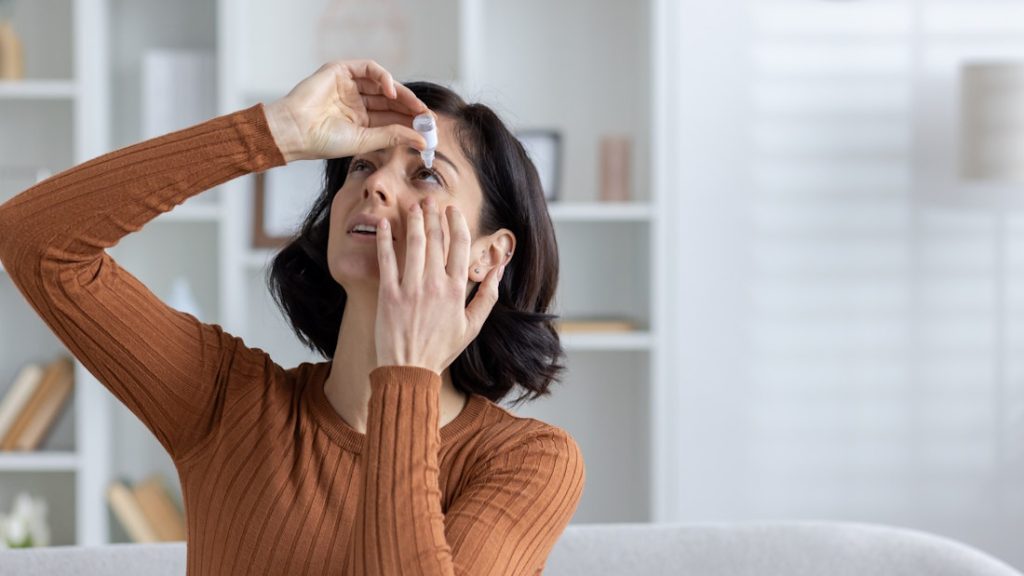If you’re one of the 30% of Canadians suffering from the symptoms related to dry eye disease, you’re all too familiar with the irritation and discomfort produced by a lack of tears. It’s no fun, and it’s a condition that will only become more common as the population ages.
If you’ve never had it, dry eye feels like your eyeball and eyelid have been fitted with an abrasive surface. Every movement causes a scratchy, gritty sensation. It almost feels like something is stuck inside your eye. In extreme cases, dry eyes can lead to a painful stinging sensation, reduced vision and sensitivity to light.
If you ever feel like you’re suffering from dry eye or something similar, visit a specialized dry eye clinic for a professional opinion and treatment.
So why do our eyes get dry and stop producing tears? In this article we’re uncovering the many reasons why:
Allergies

Common allergies to airborne things like pollen, dust, and pet dander have the ability to cause dry eyes. If your dry eye symptoms get worse during allergy season, when your allergy symptoms are also the worst, this is a good indication that your allergies are the root case.
Allergies cause dry eyes because the allergens trigger the release of a chemical compound known as histamines. These histamines spur inflammation in the eye, which therefore limits tear production. To make matters worse, people suffering from allergies often take antihistamines, a medication known to produce a drying effect.
Contact Lenses

If you feel like you’re suffering from dry eye symptoms, your contact lenses could be the culprit. When wearing contacts, the lens itself sits on the surface of the eye, which divides your tear film into two separate layers (in front and behind the lens). This separation can destabilize your tear film and cause it to evaporate faster than normal.
Besides leading to quicker evaporation, contacts present a couple mechanical problems too. For one, contact lenses (especially the thicker ones) can actually restrict oxygen flow to your cornea, which then can lead to dry eyes. Additionally, the physical presence of the lens could cause irritation or scratching if not fitted correctly.
Medications

As mentioned previously, antihistamine medication is a culprit of dry eye syndrome, as it seeks to block the effects of histamines. But antihistamines aren’t the only medication known for causing dry eyes. Antidepressants that affect the nervous system can disrupt the tear production process as well. Diuretics influence the water levels in the body, which can impact tear production. Acne medications will also limit oil production in the meibomian glands, which is necessary for the tear film. Sleeping pills, hormone-based medications, antiulcer drugs, chemo drugs, and birth control can also lead to dry eye, so be sure to check with your optometrist.
Your Environment

Your physical surroundings will also have a say in how lubricated your eyes are. If you’ve been spending time in a particularly windy environment, your dry eyes could be caused by the wind literally ripping away your protective tear layer. Not to mention the wind is a great conduit for debris that can easily irritate the eyes.
If you’re a smoker, keep in mind you could be self-inflicting damage to your eyes as well. The smoke contains chemicals and other matter that produce inflammation and oxidative stress, which is very effective at damaging the tear film.
If you live in a particularly dry place with low humidity, this could be another reason for your dry eye symptoms. Just as you’d expect, dry conditions can also dry out your eyes, leading to tear film reduction and discomfort.
Screen Time

If you spend long hours of the day glued to a screen, that could be another cause of dry eye symptoms. The reason is simple – when you look at a screen, you blink less. Our eyes rely on those regular blinks to maintain moisture within the eyes, which is the only real way to prevent dryness and irritation.
If you feel like you spend too much time in front of a screen, the best thing you can do is take frequent breaks. During these breaks, look at something other than a screen, ideally outside or at something far away. And don’t forget to keep blinking!
Sjögren’s Syndrome

A little over 400,000 Canadians are suffering from Sjögren’s Syndrome, an autoimmune disease that affects the body’s exocrine glands, leading to dry eyes and dry mouth. This fairly common disease, which primarily affects women, mistakenly attacks and damages the tear glands, which hurts the ability to produce tears. In more severe cases, Sjögren’s Syndrome creates chronic dry eye and corneal damage.
Rheumatoid Arthritis

Rheumatoid Arthritis is a chronic autoimmune disease diagnosed over 20,000 times per year in Canada that’s known primarily for attacking the joints, causing pain and stiffness. But this disease can also affect the heart, lungs, and eyes. Rheumatoid Arthritis impacts the eyes by causing inflammation, which directly hurts the tear producing glands in the eyes.
Thyroid Disorders

The thyroid is a vital endocrine gland tasked with controlling the metabolism. By producing hormones, the thyroid can regulate heart rate, body temperature, and more. Thyroid disease is a medical condition that prevents your thyroid from producing the correct level of hormones.
Someone with Hypothyroidism isn’t producing enough thyroid hormone, which are vital for bodily functions including tear production. Hyperthyroidism, including what’s known as Graves’ disease, can lead to thyroid eye disease. This disease mistakenly attacks tissues and muscles in the eyes, leading to inflammation, swelling, and tear instability.
If you’re experiencing dry eye symptoms or discomfort, it’s best to visit your optometrist right away. They can help you get the treatment you need, and potentially spot and mitigate issues before they become too severe.
Visit Inner Harbour Optometry at one of our two downtown Victoria locations. Book an appointment online or visit us in person. We hope to see you in our office soon!
